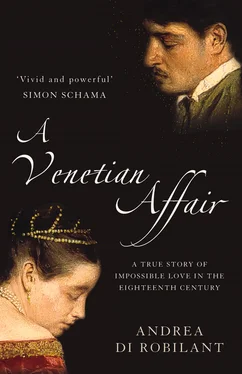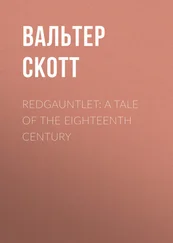In reality, Andrea stopped at the consul’s more out of a sense of duty and gratitude than for pleasure. The old man could be demanding. “When he starts talking after his evening tea, he never stops,” Andrea reported with a sense of fatigue. “He generally asks me to stay on even while he has himself undressed.” These man-to-man ramblings often touched on the Wynnes, and on several occasions Andrea could not help but notice with amusement the vaguely lustful tone Smith had begun to use when he talked about Giustiniana.
Inevitably, as Andrea and Giustiniana’s lives became more entwined and inextricable, so the hopelessness of their situation gradually sank in, bringing with it more tension and crises. Andrea filled his letters with declarations of love and devotion, but he never offered much to look forward to—there was no long-term plan that, however vague, might allow Giustiniana to dream about a future together. Instead, he made offhand remarks about how much simpler it would be if she were married to someone else or, better still, if she were a young widow “so that we wouldn’t have to take all these precautions and I could show the world how much I adore you.”
Giustiniana was having a harder time than Andrea. Her letters, always more impulsive and emotional than his, grew wilder as she swung between bliss and despair. Venice could seem such a hostile place—a watery labyrinth of mirrors and shadows and whispers. She could not get a grip on Andrea’s life or, as a consequence, on her own. The more time passed, the more she felt she was losing her way. Again and again she was overcome by waves of jealousy that brought her to breaking point.
Caterina (Cattina) Barbarigo was a great beauty and a notorious femme fatale . She held court in a casino that was much in vogue among progressive patricians and viewed with suspicion by the inquisitors. Though older than Andrea—she was married and the mother of two beautiful daughters—she liked surrounding herself with promising young men. He, in turn, was delighted to be drawn into her circle of friends—even at the cost of hurting Giustiniana’s feelings. “All day you’ve been at Cattina Barbarigo’s, haven’t you?” she asked accusingly. “Enough, I shan’t complain about it. But why have I not seen you? Why have I not received a line from you? Now that I think of it, it is perhaps better not to have received a note from you because you probably would have written late at night, in haste, and maybe only out of a sense of duty. Tomorrow, perhaps, you will write to me with greater ease.” But there was no letter on the following day, or the next, or the one after that. On the fourth day of silence her anxiety turned into rage:
You should be ashamed of yourself, Memmo. Could one possibly behave worse toward a lover one claims to be desperately in love with? I write to you on Saturday, and you don’t answer because you are at Barbarigo’s house. Sunday I never see you even though I spend the entire day at my window. And no letter—even though you know very well that on Mondays I go out and you should want to find out what the plan is in order to see me. Or perhaps you did write to me but your friend could not deliver? Do you suppose I will believe that you could not find another way of getting a letter to me, considering I had been two days without any news about you? … My mother has been ill for many days, and we could have been seeing each other with fewer precautions. But no—Memmo is having fun elsewhere. He does not even think about Giustiniana except when a compelling urge forces him to. What must I think? I hear from all sides about your new games and your oh-so-beloved old friendships .
Naturally, Andrea pleaded complete innocence: “For heaven’s sake, don’t be so mean. What rendezvous are you talking about? What have I done to merit such scorn? My dear sweet one, you must quiet down. Trust me or else you’ll kill me.” He explained, rather obliquely, that tactical considerations and nothing else occasionally forced him to be silent for a few days or to interrupt the flow of letters. But she should never forget that if he sometimes made himself scarce, it was for her sake and certainly not because he was chasing young ladies around: “You know I love you, and for that very reason, instead of complaining about your perpetual diffidence, I only worry about your position. I would have written to you every day to tell you what I was up to, but you know how afraid I am about writing to you—your mother is capable of all sorts of beastliness. All I care about is making sure the members of your household and our enemies and the crowd of people that follow every step we take do not discover our relationship by some act of imprudence on our part.”
Giustiniana was not reassured by Andrea’s words. In fact, his shifty attitude was making her more upset and more defiant:
How could you swear to me that all you cared about was my position, when in fact you were merely trying to get away from me using prudence as a pretext to rush over to see N . * ? Don’t be so sure of the power you have over me, for I shall break this bond of ours. I have opened my eyes at last. My God! Who is this man to whom I have given my deepest love! Leave me, please leave me alone. I’m just a nuisance to you. Before long you will hate me. You villain! Why did you betray me? … Everyone now speaks of your friendship with N. At first you explained yourself, and so I was at peace again and I even allowed you to be seen with her in public … and after our reconciliation you rushed off to see her again. What greater proof of your infidelity? Damn you! I am so angry I cannot even begin to say all I want…. Don’t even come near me, I don’t want to see you…. Now I see why you told me to pretend that our friendship was over; now I plainly see how fake your sincerity was, your infamous caution…. Now I know you. Did you think you could make fun of me forever? Enough. I cease to be your plaything .
Were the rumors true? Was Andrea pursuing N., or was Giustiniana working herself into a spiral of groundless jealousy? Whatever was going on, Andrea had clearly underestimated the depth of Giustiniana’s desperation. He suddenly found himself on the defensive, struggling to contain her rage: “How can I describe to you the state I am in, you cruel woman? My mind is busy with a thousand thoughts. I’m agitated and worried about a thousand questions. And you, for heaven’s sake, find nothing better to do than to treat me in the most inhuman way. Where does it all come from? What have I done to deserve all this? … Can it be that you still don’t know my heart? … Come here, my sweet Giustiniana, speak freely to your Memmo.”
Andrea understood more plainly now that as long as Giustiniana felt locked into a relationship with no future she would only become more anguished and more intractable and their life would become hell. But he remained ambivalent: “Tell me if you want to get yourself out of this situation you’re in. Tell me the various possibilities, and however much they might be harmful to me, if they will make you happy…. Speak out, and you will see how I love you.” Was he conjuring up the idea of an elopement? Was he beginning to consider a secret marriage, with all the negative consequences it would have entailed? If so, he was going about it in a very circuitous and tentative way, as if this were merely a short-term device to placate Giustiniana’s wrath. In fact, already in his next letter he retreated to his older, more traditional position: their happiness, as far as Andrea was concerned, hinged on finding Giustiniana a husband. “Alas, until you are married and I am able to see you more freely, there won’t be much to gain. Meanwhile let us try to hurt each other as little as possible.”
Читать дальше












